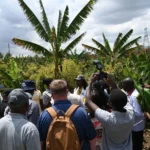By Bozo Jenje Bozo | bozojenje@yahoo.com
Hermit crabs are seen hovering beneath the mangrove plantations as one walks on the 450- metre
plastic recycled ecopost boardwalk at the shoreline of Gazi Bay in Kwale County. Carrying empty
snail shells on their backs, the crabs transverse the sandy ground, feeding on leaf littre and green
leaves. The crabs’ survival is of immense value to the mangrove ecosystem and biodiversity, and to
the local artisanal fishermen who harvest them as baits as they fend for their livelihood. On the
coastal shoreline, the evergreen mangrove trees are dominant and one cannot easily figure out that
the area was once degraded from human activities.
Addressing journalists at Gazi Village during the Media for Environment, Science, Health and
Agriculture (MESHA) with support from JRS Biodiversity Foundation, Dr Kipkorir Langat said before
an intervention to stop mangrove destruction, lorries used to ferry tonnes of mangrove logs for lime
and charcoal production. “It is through the efforts of Kemfri and the community to plant propagules,
transplant mangrove saplings and nursery-raised seedlings that the 27 women in Gazi village are
now benefiting from the green economic activities of mangrove conservation,” added Dr Langat who
works as a chief scientist at the Kenya Marine and Fisheries Research Institute. He said the 1994
restoration initiative that started at Gazi led the women to sustainably utilise the mangrove
resources and improve the mangrove ecosystem for their livelihood.
Other than caring for the mangroves, the Gazi Women’s Group also runs a makuti-thatched
restaurant. Mwatime Hamad, a member of the group and a tour guide, says the project located
50km from Mombasa has boosted their income from eco-tourism, recreation, education and
research. “We charge visitors a fee to walk on the on one-metre, raised boardwalk and also provide
Swahili dishes for their lunches and dinner while on tour,” says Hamad. “Local tourists pay Ksh100
(USD 1), international visitors Ksh300 (USD3) and students Ksh50 (USD 0.5) per person. The money
collected supports women in the village and their children in school,” she says.
While touring the mangrove area, tourists also participate in bird watching. Among the diverse bird
species are the fish eagles and white egret birds. Hamad says during peak seasons, they earn about
Ksh30,000 (USD 300) per month, while during low seasons the income goes down to Ksh10,000 (USD
100). In future, the group targets about 350 customers every month to increase its revenue. At the
moment the women have diversified their revenue streams to include hiring of the Banda at
Ksh3,500 (USD 35) for birthday parties and meetings.
Further, Hamad says the project plans to expand to incorporate campsites and floating cottages. Dr
Langat said the mangrove ecosystem supports fisheries and prevents soil erosion. “The benefits of
mangrove include shoreline protection from soil erosion, storage and preservation of substantial
quantities of carbon and biodiversity,” he explained. Dr Langat said the mangrove ecosystem also
contributes to the productivity of the ocean value chain for artisanal fishing.
According to the Kenya Policy Brief, a hectare per year of mangrove provides essential service valued
at Ksh269,448 (USD 2694). On the women’s connection to the mangrove conservation, Kemfri
marine scientist Josphat Nguu said the women can now attest to managing a business without
employing and paying external workers. “From their experience, they have learned that marketing
the conservation project is a key component for growth and success,” he said. Nguu added that for
the prosperity of the group, diversification of their products will increase more income for
sustainability and the maintenance of their infrastructure.







